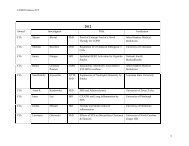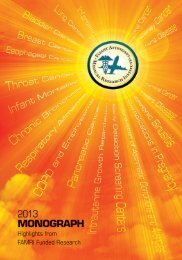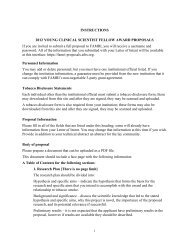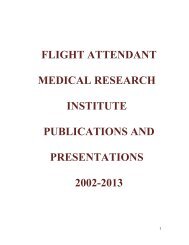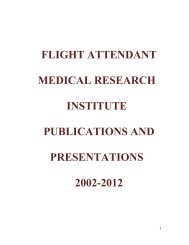MISSION
2009 compendium of FAMRI-supported research - Flight Attendant ...
2009 compendium of FAMRI-supported research - Flight Attendant ...
Create successful ePaper yourself
Turn your PDF publications into a flip-book with our unique Google optimized e-Paper software.
IMMUNE FUNCTION IMPACTED BY TOBACCO SMOKE<br />
CURRENT RESEARCH<br />
A2A RECEPTOR ANTAGONISM AS A NOVEL MEANS TO ENHANCE VACCINE THERAPY FOR THE TREATMENT<br />
AND PREVENTION OF BREAST CANCER<br />
Jonathan D. Powell, MD, PhD; Columbia University; CIA 2006<br />
The ability of the immune system to specifically recognize antigen makes it a potentially powerful tool in<br />
terms of developing modalities to treat breast cancer. However, in spite of many recent advances in<br />
identifying tumor antigens, immunotherapy has yet to live up to its full potential. In part this is due to the<br />
ability of tumors to evade immune destruction by turning off tumor-antigen specific immune cells.<br />
Recently, data have emerged demonstrating that the A2a adenosine receptor plays an important role in<br />
downmodulating immune responses. Dr. Powell’s lab has been able to demonstrate that A2a engagement<br />
of T cells not only inhibits T cell function but also promotes the generation of T cell tolerance and T-<br />
regulatory cells. Since the tumor microenvironment contains high concentrations of adenosine, the<br />
investigators propose that tumor-derived adenosine acts to inhibit immune function and promote tumorspecific<br />
T cell tolerance. Indeed, recent data using A2a receptor (A2aR) null mice indicate that such mice<br />
mount more robust antitumor responses leading to their enhanced ability to reject tumor challenge. In<br />
addition, these mice respond better to tumor-specific vaccines as treatment for pre-existing tumors.<br />
Mechanistically, these data suggest that A2aR mice are resistant to anergy induction in vivo and develop<br />
less antigen-specific Lag-3+ regulatory T cells. Currently, the research team is examining the affect of<br />
specific A2aR antagonists to enhance tumor vaccines in tumor-bearing wild-type mice. The PI predicts that<br />
such studies will identify an A2aR antagonist compound that can be integrated into clinical trials.<br />
FAMRI Supported Publications<br />
Sikder HA, Huso DL, Zhang H, Wang B, Ryu B, Hwang ST, Powell JD, Alani RM. Disruption of Id1<br />
reveals major differences in angiogenesis between transplanted and autochthonous tumors. Cancer Cell<br />
2003;4:291-299.<br />
Zarek PE, HuangCT, Lutz ER, Kowalski J, Horton MR,Linden J, Drake CG, Powell JD. Blood<br />
2008;111:251-259.<br />
SECOND HAND TOBACCO SMOKE, IMMUNITY AND ALLOGRAFT REJECTION<br />
Zhenhua Dai, MD, PhD; University of Texas Health Center at Tyler; CIA 2008<br />
Transplantation is emerging as a more common and critical approach to save lives of patients at the endstage<br />
of various organ diseases including the heart and kidney. However, studies on the role of cigarette<br />
smoking in allograft rejection and alloimmunity in a cause-effect manner are lacking.<br />
Current protocols to induce long-term allograft survival include conventional immunosuppression,<br />
costimulatory blockade and the generation of regulatory T cells (Treg), etc. In particular, approaches to<br />
suppress memory T cell generation but induce Treg cells are essential for long-term allograft survival. Dr.<br />
Dai’s preliminary data have shown that SHS increases memory T cell number and hinders allograft survival<br />
induced by CD40/CD154 costimulatory blockade. In this proposal he hypothesizes that SHS shortens<br />
allograft survival by suppressing Treg cell development but promoting memory T cell recall. In Aim 1, the<br />
PI investigates the impact of SHS on the function of memory CD4+ and CD8+ T cells. In Aim 2, he will<br />
study whether SHS suppresses the generation and function of CD4+CD25+FoxP3+ Treg cells. Finally, in<br />
Aim 3, he will examine whether targeting memory T cells and administering Treg cells suppress allograft<br />
rejection related to SHS. In this study, a murine cardiac transplant model will be implemented and<br />
recipient mice will be exposed to a precision-guided smoke chamber mimicking SHS. This study for the<br />
first time will provide insight into the immunologic mechanisms by which SHS promotes allograft<br />
rejection. This proposal also has clinical implications for the prevention and treatment of graft rejection<br />
caused by the exposure to SHS.<br />
ALTERATIONS IN DENDRITIC CELL-MEDIATED IMMUNITY CAUSED BY SMOKING<br />
Robert Vassallo, MD; Mayo Clinic; YCSA 2005<br />
Dr. Vassallo proposes that cigarette smoking and nicotine suppress the function of dendritic cells in a<br />
very specific fashion. The PI hypothesizes that smoking diminishes host immune responses necessary for<br />
elimination of tumors and infections, and enhances the development of immune responses that lead to<br />
allergy and asthma. Using a murine smoking model the goals are to: 1) determine the effect of smoking on<br />
P A G E 1 9 1



